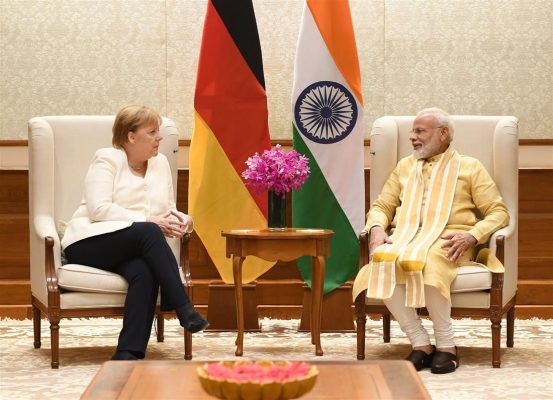
New Delhi: Indo-German relations got a boost when the two countries agreed to step up their bilateral and multilateral cooperation in combating terrorism and extremism, enhancing trade and space cooperation as well as the use of technology like Artificial Intelligence in various areas.
At the end of the fifth Inter Governmental Consultations between Prime Minister Narendra Modi and German Chancellor Angela Merkel, the two sides inked five declarations of intent and 11 agreements in different sectors including Artificial Intelligence (AI), Space, Civil Aviation and Education.
In a joint address to the media, Prime Minister Modi said: “We have vowed to build ‘new India’ by 2022 and expertise of technological, economic powerhouses like Germany will be useful for it.” “India and Germany have resolved to intensify bilateral and multilateral cooperation to deal with the threats of terrorism and extremism,” he said.
Modi invited the German companies to invest in the Defence Industry Corridors in Uttar Pradesh and Tamil Nadu.
With the focus on Strategic Cooperation, both countries have identified and stressed on seeking a deeper relationship in the field of new and advanced technology and in Artificial Intelligence, skills, education, cybersecurity. Also, new areas have been identified to further expand Indo-German relation. These include e-mobility, fuel cell technology, smart cities and inland waterways, coastal management, cleaning of rivers and climate change.
On the agreements inked between the two countries, the visiting leader Ms Merkel said the pacts are proof of the relationship between the two countries growing in areas of new and advanced technology. Also, AI and 5G are new technologies and both sides will work on them together.
The German leader has also offered to work in the Indian projects in the infrastructure sector.
In a joint statement issued at the end of talks, India and Germany focussed on the fight against global terrorism and called for the finalisation and adoption of the Comprehensive Convention on International Terrorism (CCIT) in March 2020.
The two countries agreed to further intensify efforts for an early conclusion of India-European Union Free Trade Agreement. India expressed its appreciation of the European country’s decision to reinstate its policy to grant investment guarantees for eligible direct investments by German companies in India as a means to deepen bilateral economic ties.
During talks, both sides spoke of the success of the ‘Make in India Mittelstand’ (MIIM) Programme which has helped facilitate over 135 German Mittelstand and family-owned companies with a declared investment of more than 1.2 billion Euros.
In accordance with the international, European and national rules, Germany has agreed to facilitate the export of military equipment as well as technology sharing with India.
Under the Make in India initiative, the two sides sought deeper cooperation between the Defence Industries of both countries urging co-development and co-production.
In view of the shared stability and peace in the Indian Ocean, maritime projects especially submarine projects were encouraged and also the two sides sought stronger cooperation in the defence industry testing and certification.
There will be regular defence dialogue once in every two years in India and Germany as alternate venues.








